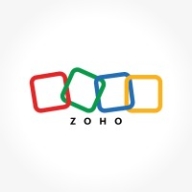


Find out what your peers are saying about Microsoft, Salesforce, SAP and others in CRM.
Salesforce Sales Cloud is a fantastic tool but requires disciplined data entry by sales personnel and operations teams to maintain data quality.
We are not just implementing Salesforce Sales Cloud; we need to understand what the customer wants to achieve in 5 to 10 years.
I would rate customer support as ten out of ten.
While the support operates within their standard SLA, it can be difficult to speak directly with someone over the phone.
Sometimes the technical support for Microsoft Dynamics CRM is not qualified enough, and in some situations, we know the tool better than they do.
Support requires a subscription and when taken, the service is pretty nice.
Sometimes, they don't understand what my actual needs are.
The 1.5 deduction from 10 is due to cultural communication differences based on where we're getting the support, as sometimes it takes a couple of times to communicate clearly enough for them to understand the issue.
There are multiple blogs and articles available online for self-help.
Microsoft Dynamics CRM is highly scalable, rated at ten, even fifteen out of ten.
I would give it a ten out of ten for scalability.
Salesforce is highly scalable and operates efficiently.
Salesforce Sales Cloud is totally cloud native, requiring no additional effort for scalability.
The system is easy to understand, implement coding, and conduct training.
Zoho CRM is quite scalable; I have worked with clients who started with ten companies and have scaled up to managing 500 employees effectively within Zoho CRM.
The platform's global data centers across regions such as the US, EU, and India ensure data security and privacy through ISO certification and strong role-based security, which is essential for handling sensitive customer data.
I would rate it ten out of ten.
Salesforce Sales Cloud is very stable.
I have not experienced any degradation in Salesforce's performance.
Zoho CRM guarantees 99% uptime, with downtime incidents being very rare.
I find Zoho CRM to be 100% stable and reliable as far as I know.
It is usually compliant with data regulation laws and is HIPAA compliant.
More use-case-oriented material should be provided to help users and implementers learn how to do more, faster.
Microsoft Dynamics CRM needs improvement in simplifying the setup and configuration process, which can be relatively complex when we want all features to work properly.
Compared to AWS, it is slower, which could be a hindrance.
With today's generative AI capabilities like ChatGPT, it should be possible to directly communicate with the software rather than navigating through the entire system manually.
The platform does not save code versions similar to GitHub, where you can compare new versions with previous ones.
Some organizations may prefer not to have their data on the internet since Zoho CRM runs as a cloud service.
The main improvement needed for Zoho CRM is introducing SQL code for reports, similar to what's in Zoho Analytics.
The pricing of Microsoft Dynamics CRM can be complex due to Microsoft's complicated licensing model.
Microsoft Dynamics CRM costs about $110 to $115 per user per month, following a recent price increase.
Without negotiation, costs can become expensive.
This happened for the first time because of the new CEO, Arundhati, who revolutionized pricing strategies, allowing discounts of 60-70% for Salesforce Sales Cloud in India.
I would rate the price for Salesforce Sales Cloud as a three, where one is a high price.
Zoho CRM and all of Zoho's software are quite affordable because they are specifically designed for small and medium businesses.
In terms of my experience with the price and licensing cost, as with setup cost for Zoho CRM, it might not be quite affordable because there are cheaper solutions available.
The backend storage integrates seamlessly with OneDrive, and the solution offers robust security features, including Azure integration, two-factor authentication (2FA), and comprehensive audit trails.
The CRM is very fast, which is the most important aspect, and it's very handy.
The most valuable feature of Microsoft Dynamics CRM is its integration with Outlook and other Microsoft products like Microsoft 365, which includes emails, Teams, and SharePoint.
Its easy-to-navigate interface aids in delivering clear vision and organization, especially for sales and business management.
The Einstein Analytics and the inbuilt reporting are very useful for keeping track of pipeline movement.
The biggest benefit of the Salesforce Sales Cloud is a centralized point, a centralized source of truth for customer-related information; you centralize all the information in a single database, and that's the biggest benefit.
The most valuable aspect of CRMs, including Zoho CRM, Salesforce, and Microsoft Dynamics, is automation capabilities.
The most valuable feature I have found in Zoho CRM is custom functions. You can achieve anything with it. From integrations with other applications, it is instant.
You can customize everything—what you sell, be it products, services, or projects.
| Product | Market Share (%) |
|---|---|
| Microsoft Dynamics CRM | 4.4% |
| Salesforce Sales Cloud | 3.5% |
| Zoho CRM | 1.8% |
| Other | 90.3% |



| Company Size | Count |
|---|---|
| Small Business | 40 |
| Midsize Enterprise | 22 |
| Large Enterprise | 19 |
| Company Size | Count |
|---|---|
| Small Business | 54 |
| Midsize Enterprise | 26 |
| Large Enterprise | 40 |
| Company Size | Count |
|---|---|
| Small Business | 44 |
| Midsize Enterprise | 6 |
| Large Enterprise | 10 |
Microsoft Dynamics CRM is a comprehensive customer relationship management solution that helps businesses streamline their sales, marketing, and customer service processes. With its user-friendly interface and powerful features, it enables organizations to effectively manage their customer interactions and drive business growth.
One of the key features of Microsoft Dynamics CRM is its sales automation capabilities. It allows sales teams to track leads, manage opportunities, and close deals more efficiently. The solution provides a centralized platform for managing customer information, enabling sales representatives to access real-time data and make informed decisions. It also offers tools for forecasting, pipeline management, and sales analytics, helping businesses optimize their sales processes and drive revenue growth.
In addition to sales automation, Microsoft Dynamics CRM offers robust marketing automation features. It enables marketers to create and execute targeted marketing campaigns, track campaign performance, and generate actionable insights. The solution provides tools for lead management, email marketing, social media integration, and customer segmentation, allowing businesses to engage with their customers effectively and drive marketing ROI.
Furthermore, Microsoft Dynamics CRM helps organizations deliver exceptional customer service. It provides a unified view of customer interactions, enabling customer service representatives to deliver personalized and timely support. The solution offers case management, a knowledge base, and self-service portal capabilities, empowering customers to find answers to their queries and resolve issues on their own. It also provides tools for service analytics and reporting, helping businesses identify areas for improvement and enhance customer satisfaction.
Salesforce Sales Cloud is a comprehensive CRM platform designed for efficient lead management, sales forecasting, and customer engagement, offering extensive customization and cloud-based accessibility.
Aimed at enhancing business efficiency, Salesforce Sales Cloud supports core business processes like CRM, lead and opportunity management, sales forecasting, and customer engagement. Its robust integration capabilities allow seamless connectivity with ERP systems and various applications. The platform offers pipeline tracking, process automation, and advanced sales cycle management. Users appreciate its cloud-based accessibility, allowing teams to operate remotely and manage sales operations effectively. However, users highlight concerns about its complexity, cost, and the need for a more intuitive interface.
What features does Salesforce Sales Cloud offer?Salesforce Sales Cloud is widely implemented across industries such as finance, healthcare, and retail, supporting sales teams in tracking and managing sales operations. Its use extends to reporting, collaboration, and enhancing client interactions, allowing companies to tailor Salesforce to meet industry-specific requirements efficiently.
Zoho CRM empowers organizations with a complete customer relationship lifecycle management solution for managing organization-wide Sales, Marketing, Customer Support & Service and Inventory Management.